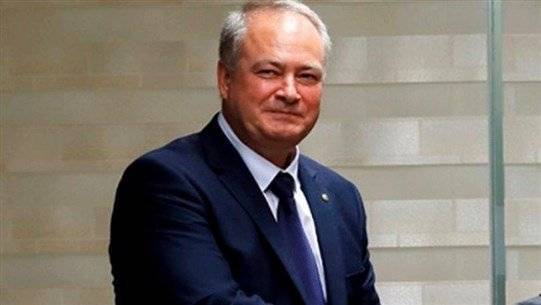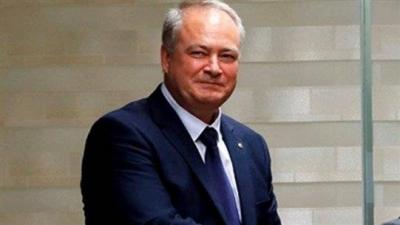Russian Ambassador Alexander Rudakov, accompanied by Mohammed Nasser al-Din representing the tribes and families of Baalbek-Hermel, visited the municipality of Hermel following his tour of the Asi spring, Mar Maroun Monastery, and Qamoua in Hermel. He met with the mayor, Sobhi Saqr, and members of the municipal council, who presented him with a book and a basket containing local products adorned with the Russian flag.
The people and tribes of Baalbek-Hermel honored the Russian ambassador at a large popular gathering attended by representatives from military and security leaders, Hermel's Qaemmaqam Talal Qattaya, head of the municipal union Nasri al-Haq, mayors, mukhtars, tribal leaders, local figures, and economic and academic representatives. Rudakov awarded Nasser al-Din with a Medal of Merit from the Russian Ministry of Emergency Situations for his efforts following the Beirut port explosion.
The ceremony included a speech festival that began with the national anthems of Lebanon and Russia.
Rudakov confirmed the deep relationship between the Russian Federation and Lebanon, indicating that Lebanon has become home to a small but active Russian migrant community, primarily through marriage. He acknowledged Lebanon’s support for Russia’s actions on the international stage at a critical and decisive time for the entire international community.
He stated, "The West has chosen the path of coercion and dictatorship in imposing its will instead of building a strategic partnership aimed at strengthening global peace and security," adding that NATO countries continue to escalate their aggressive activities, primarily targeting Russia and any nation aspiring to an independent and free policy, as well as any people wanting to live according to their traditions and cultural, historical, and religious values.
Rudakov stated that "the fate of the world depends on the Ukrainian crisis," pointing out that the spread of neo-Nazi elements in Ukraine, the activities of laboratories involved in the U.S. military biological program, and the intentions of the Kyiv regime to acquire nuclear weapons and join NATO have created significant global threats. He noted that the military operation was a necessary response to prevent the catastrophic development of events. Following the full liberation of Lugansk, parts of the Donetsk Republic, Kherson, and some areas of Kharkiv and Zaporizhzhia from neo-Nazis, normal life has begun to recover in these regions.
He remarked that "despite the war, Russia continues to fulfill its obligations under trade contracts and continues to provide free assistance to needy countries." He mentioned that since last February, 6,000 tons of Russian food products have been delivered to Lebanon, Yemen, Sudan, Cuba, and other countries through the United Nations World Food Program, with 281 tons of sunflower oil reaching Lebanon at the end of last month. "Russia does not obstruct the export of agricultural products from Ukrainian territory, and we are ready to supply millions of tons of our grains if the Western sanctions are lifted for that purpose. We are prepared to provide all mutual support to our Lebanese friends. The Russian-Lebanese government committee for trade and economic cooperation is looking into activating our partnership in energy, medicine, agriculture, transportation, customs, and information technology. We are providing facilities for Lebanese students who studied in Ukraine to continue their education at Russian universities, which benefits both Russia and Lebanon, as well as the enhancement of global peace, security, and stability."
The Russian ambassador confirmed that "after the port explosion, several Russian teams from the Ministry of Emergency Situations arrived in Lebanon, and there were difficulties in assisting the Lebanese from the aftermath of the explosion. With the efforts of Mohammed Nasser al-Din, we presented him with a medal, and today we award him a new medal for his contributions and efforts."
Dr. Ayman Zaiter, the director of the Islamic University, gave a speech on behalf of the Amal Movement, emphasizing that "Russia is a bridge of peace between the world, has provided educational opportunities for youth, and has fought against terrorist hotspots that have operated in our region and in Syria, achieving victories by creating a new equation."
Father Elian Nasrallah, a priest of the Qaa Parish, stated: "From where the cave of Mar Maroun rises alongside the mosques and the meeting of religions, I say to the ambassador of Russia: welcome to Hermel. I must tell you that the first doctor to graduate from the Russian Federation is from the town of Qaa." He acknowledged the active role Russia is playing on the international stage.
For his part, Nasser al-Din delivered a speech on behalf of the tribes and families of Baalbek-Hermel, stating: "What we have sensed is that Russia wants peace, and it continues to provide support to Lebanon in international forums and within and outside the UN Security Council." He pointed out that "there is media separation in the attacks on Russia due to the Ukraine war, countered by popular sympathy from a Lebanese elite that stands out from its governments. This is an expression of the appreciation of the Lebanese for Russia's role."
He viewed that "Russia has been the first to welcome Lebanese students unconditionally, and Lebanon looks forward to Russia to take the lead in crafting solutions."
In conclusion, Ambassador Rudakov awarded the Russian Emergency Medal to Nasser al-Din.




